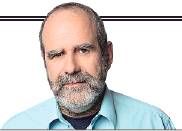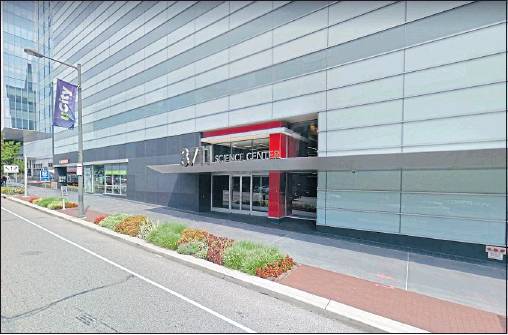PHILLY DEALS
Rent hikes could force out UCity labs
JOSEPH N. DISTEFANO @PhillyJoeD
Philadelphia’s old brick residential neighborhoods aren’t the only part of the city that’s being gentrified.
The same thing is happening to University City’s rental lab space, where some rents are quadrupling. It’s a sign of success and the flood of investment boosting biotech firms. But it’s also a threat to startups that could force brainy startup leaders to flee to cheap space in the suburbs or go out of state, some university officials, start-up founders and young scientists say.
This fall and winter, the center plans to shut 20,000 square feet of lab space at 3711 Market St. and 3624 Market St., housing 19 small companies. At the same time, a large new center tenant, Massachusetts-based Cambridge Innovation Center (CIC), is arranging with lab operator BioLabs to open 22,000 square feet of new lab space and a larger office area at the Science Center’s 3675 Market St. building.
Those updated labs will then lease memberships for a higher price — $2,500 a month — versus current rates that work out to around $600 for similar space, or less for start-ups subsidized under existing programs. To ease the price shock, the new operator has offered a special $1,500-a-month rate for the first six months for firms that move into the new Cambridge space instead of leaving the neighborhood or shutting down.
The move affects the area with a big concentration of labs and it makes out-of-state venture capitalists the neighborhood’s startup landlords. CIC, which also has sites in St. Louis, Miami and the Netherlands, is headed by Tim Rowe, partner in Cambridge, Mass., and Reston, Va., venture capital firm Mid Atlantic Ventures. BioLabs is headed by Johannes Fruehauf, partner in BioInnovation Capital, of Boston.
The science center, a55-yearold nonprofit consortium of Penn, Drexel and other institutions, controls 11 prime blocks and more than two million square feet of rental space along Market and Chestnut Streets next to the Penn and Drexel campuses. It rents offices to professors, doctors, businesses, government agencies and other tenants — and is adding stores and apartments as it plans to more than double its footprint — in what has become one of the region’s highest-rent districts.
But under its series of chief executives, most recently Stephen Tang, who left last winter to serve as chief executive of OraSure in Bethlehem, the center and its board have proclaimed its mission is more than that of a landlord: It also helps science-based businesses grow up next door to the universities, in hopes they will add jobs to a town where most big employers are hospitals and colleges and few are homegrown tech firms.
Outsourcing lab managers “was a strategic decision,” Science Center spokeswoman Jeanne Mell said. By leaving labs to CIC and its “higher level of service,” the center fits better with an “emerging national trend.”
Mell said that leaves the center to get out of the lab landlord business and “focus on what we do best,” connecting start-ups and their owners “to our network of investors, subject matter experts, advisors and mentors,” and large companies to help bring startup products to market.
Does jacking up rents fit UCSC’s mission of keeping young companies in Philadelphia? Mell deferred pricing questions to CIC. Its managing director, Doug Sherwood, maintained in an email that the old and new rates are “not comparable” because his company charges a membership fee for expanded services, not a lab-bench or floor-space rate.
He said CIC has boosted biotech tenants in Cambridge, Mass., and that Philadelphia, with its innovative cluster of medical schools, is ripe for similar treatment. Asked whether his company demanded the center shut its lower-priced labs as a condition for Cambridge’s new ones, Sherwood wrote, “we’re not going to disclose the terms and details of our leases.”
With the higher prices, University City could face “a bit of an artificial shortage” of lab space once the science center shuts its two sets of labs, said Roy Rosin, chief innovation officer at Penn Medicine and a key contact with the private sector. (Rosin is a board member of the Lenfest Institute, which owns Philadelphia Media Network, which operates the Inquirer, Daily News and Philly.com.) “I don’t want to see a situation where lack of affordable space negatively impacts the Philly ecosystem,” he added.
To be sure, a landlord’s bet that a market can support higher rents is one sign of success. Professor-founded biotech hopefuls such as Spark Therapeutics and Tmunity have attracted multi-million-dollar private investments, and can afford newer, more modern labs and services.
But “that doesn’t eliminate the need for space that can be a springboard for younger high potential companies that don’t yet have that same ability to pay,” Rosin said.
Significant increases in lab rents “could force some outstanding startups to make the difficult decision to leave Philly and the University City destination, where we’d like a high density of talent and frequent interactions with Penn. I don’t want to see that happen.”
Penn has tried to ease pressure on start-ups in part by building Pennovation, an engineering and lab center at the former DuPont Co. Marshall Labs paint factory in South Philly’s Grays Ferry, where start-ups fit onto lab benches next to Penn-scholar-staffed projects sponsored by Comcast, Hershey, Qualcomm and other big corporations. But it’s not enough, Rosin said. “The waiting list indicates we still need more start-up space.”
Among the start-up CEOs weighing difficult options as the Science Center plans to shut her lab is Brianna Wronko, a 2017 Penn grad who’s been working in Penn science and engineering labs since before she was in college.
Wronko’s nine-person company, Group K Diagnostics, based on the fifth floor of 3624 Market St., is facing a steep rent increase, from a startup-discounted $1,800 a month for a four-person lab, to $10,000 a month after the six-month move-in discount expires, the company calculates. “There’s no other place for Group K and the other labs to go within Philadelphia, other than Pennovation, and there’s a waiting list to get in there,” Wronko told me.
She said that staff at BioAdvance, one of several start-up investors that have supported Group K, suggested suburban sites, including labs operated by Lankenau Medical Center, based in Wynnewood — a 20-minute walk from the Overbrook Septa station or a long bus ride for her staff. All are city residents who don’t own cars, she told me.
She’s also looking into sites in Delaware, including an ex-DuPont site that the state is helping redevelop for start-ups. But Philly would be best: “A lot of people move. But we want to stay here. This is home,” if her firm and others like it can still find affordable space, Wronko said.
Corporate labs in Montgomery and Bucks Counties have been re-purposed for small biotech firms, said real estate broker Paul Touhey, senior vice president at CBRE’s Philadelphia office. “There’s a need for lab space [compared to] more than five years ago. We have a lot of interest,” he said.
Will start-ups be forced elsewhere? “They might. If it’s great technology they’ll get investors somewhere.” jdistefano@phillynews.com
215-854-5194
@PhillyJoeD

